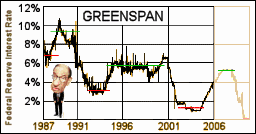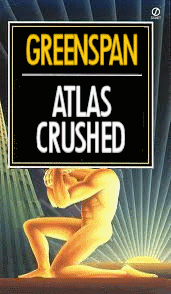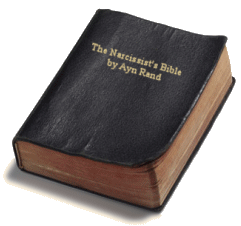In Frontline’s The Warning there’s a dramatic moment when Brooksley Born, then the new chairperson of the Commodity Futures Trading Commission [CFTC] goes to the Federal Reserve to meet with chairman Alan Greenspan for the first time. She doesn’t talk about it on camera, but her colleagues tell the story for her:
|
Greenspan: "Well Brooksley, we are never going to agree on fraud."
Born: "What do you mean?"
Greenspan: "You probably think there should be rules against it."
Born: "Well, yes I do."
Greenspan: "You know, I think the Market will figure it out – take care of the fraudsters."
|
When Brooksley Born tried to interest Congress in regulating Derivatives, Alan Greenspan, Chairman of the Federal Reserve, Robert Rubin, Secretary of the Treasury, and Larry Summers, Deputy Secretary of the Treasury, opposed her in Hearing after Hearing, finally succeeding in getting Congress to forbid her exploration of regulating the Derivative Market.
At that point, she gave up and resigned.
Alan Greenspan was an actual disciple of author Ayn Rand and one of her readers as she wrote the book, Atlas Shrugged. Rand was a Russian immigrant who preached a strong gospel of free market capitalism. She said, "I believe in the separation of the economy and the state." And Alan Greenspan was her Prophet – the Prophet of Deregulation. In his autobiography, he writes that he realized that as Chairman of the Fed, he would have to enforce Laws he didn’t believe in. That implies that when unconstrained by Law, he always came down on the side of government non-involvement in the Market. Social Darwinism – the survival of the fittest – Ayn Rand 101.
 Joseph Stiglitz, the Nobel Economist, point out the obvious contradiction – that Alan Greenspan was Chairman of the largest Bank we have, the Federal Reserve, that literally controls the economy by setting the Interest Rates. How much more involvement can the government have in an economy than that? Which brings us to the second piece of Greenspan’s involvement in the 2008 crash – the Interest Rates he set throughout the 1990’s.
Joseph Stiglitz, the Nobel Economist, point out the obvious contradiction – that Alan Greenspan was Chairman of the largest Bank we have, the Federal Reserve, that literally controls the economy by setting the Interest Rates. How much more involvement can the government have in an economy than that? Which brings us to the second piece of Greenspan’s involvement in the 2008 crash – the Interest Rates he set throughout the 1990’s.
Greenspan was appointed to the Fed by President Reagan in 1987 when we were still dealing with the Savings and Loan Crisis – the first debacle of deregulation. When Recession followed, Greenspan lowered the Interest Rate to around 3% [low], but then as the Recession abated, he only raised it up to 6% and kept it there for over six years [also low]. As I’ve noted earlier [skipped a step…, fundamentals…, back to the future…], in keeping the rates so low, he did two things. First, he enabled an unheralded building and buying boom in the housing market that progressed uncorrected. Second, he restricted Bank profitability pushing them to look elsewhere for yield. But he sure made us feel good, the golden Clinton era. When the dotcom bubble burst, he lowered Interest Rates to an unprecedented 1%. As with his earlier Recession, he nipped it in the bud, but took away our only tool to fight future Recession by leaving us no buffer.  His management of the Fed aided and abetted Wall Street, made us all feel good, and slowly set us up for a really big fall.
His management of the Fed aided and abetted Wall Street, made us all feel good, and slowly set us up for a really big fall.
There was something else in his power most of us didn’t know much about. The Federal Reserve has the power to investigate and prosecute predatory lending. Greenspan just didn’t do it. And when people began to urge him, he refused. This is a big story well summarized here, but the essence of things is like so many other parts of this story, the explanations were that it wouldn’t work, we wouldn’t find anything, it was too much trouble. It was another example of his repeated refrain, "The Market would take care of it." When asked about why he didn’t pursue predatory lending in 2007, he said:
|
There is "a very large number of small institutions, some on the margin of scrupulousness and very hard to detect when they are doing something wrong," says Mr. Greenspan, who retired in February last year. "For us to go in and audit how they act on their mortgage applications would have been a huge effort, and it’s not clear to me we would have found anything that would have been worthwhile without undermining the desired availability of subprime credits." Mr. Greenspan adds that borrowers might get a false sense of security from a lender that advertised itself as Fed-inspected.
|
That’s a remarkable comment. We didn’t investigate because we might undermine the very thing that would shortly spell our doom? Outrageous!
So Greenspan may not have single-handedly created the housing bubble and the subsequent crash, but he actively fought for the environment that let made it happen. He vigorously defended the unregulated Derivative Markets created by Wendy and Phil Graham under his watch, then blocked Brooksley Born’s attempt to rein it in. He set and maintained the low Interest Rates that enabled rampant building and buying in the housing industry. And he so supported sub-prime rates that he refused to investigate the criminal lending that fueled the bubble. As the housing bubble became apparent, Greenspan "brushed aside worries about a potential bubble, arguing that housing prices had never endured a nationwide decline and that a bust was highly unlikely." To my mind, his greatest sin was in not pursuing fraudulent lending. He worked for the taxpayers, but refused to enforce the Laws against taking advantage of them with fraudulent lending practices. From his Congressional Testimony after the bust:
|
Waxman: "You had the authority to prevent irresponsible lending practices that led to the subprime mortgage crisis. You were advised to do so by many others. Do you feel that your ideology pushed you to make decisions that you wish you had not made?"
Greenspan: "Yes, I’ve found a flaw. I don’t know how significant or permanent it is. But I’ve been very distressed by that fact."
Waxman: "Were you wrong?"
Greenspan: "Partially… Yes, I found a flaw…, [a] flaw in the model that I perceived is the critical functioning structure that defines how the world works, so to speak. That’s precisely the reason I was shocked, because I had been going for 40 years or more with very considerable evidence that it was working exceptionally well."
|
Greenspan means that he found a flaw in his ideas about how to run the Federal Reserve Bank or maybe in his confidence in the self-correcting powers of the Market. And at another point in his testimony, he said:
| Greenspan: "Those of us who have looked to the self-interest of lending institutions to protect shareholders’ equity, myself included, are in a state of shocked disbelief." |
Yet in that testimony, he continued to argue against regulation and suggests that the market will be self-correcting – in spite of his "shocked disbelief."
| Greenspan: "Whatever regulatory changes are made, they will pale in comparison to the change already evident in today’s markets. Those markets for an indefinite future will be far more restrained than would any currently contemplated new regulatory regime." |
There is indeed a flaw, but it’s not in Alan Greenspan’s theory – it’s in his character.
In everyday parlance, the word "character" is used as if it means "morality." In Psychoanalytic usage, it has something of a different meaning – more like the meaning in literature. It refers to to that collection of personality traits that define a person – those embedded patterns of behavior that each of us repeats over and over again. It’s not really fair for Psychoanalysts like me to analyze people we don’t know – human motivation is just too complex for such armchair theorizing. But it is perfectly fair for us to look at blatant patterns in a story that repeat themselves.
With Greenspan, there are several such persistent patterns. He went to Juilliard as a young man intent on being a Jazz clarinetist, but quit before he graduated to go on the road with a band. After a year, he gave up his hipster fantasies and returned to NYU for a BA and MA degree in economics with flying colors He started working on a PhD at Columbia, but quit before completing it to go into business on Wall Street. He was successful there too, but longed for a place in government. He was Gerald Ford’s Chairman of the Council of Economic Advisers for a time. He was finally granted his PhD in Economics in 1977 from NYU with a thesis largely based on papers from his stint in Government. What’s the pattern? He throws himself into something, becoming a shining star, then quits before he gets to the end of the road – in music, in economics, on Wall Street, and as Chairman of the Federal Reserve.
Another repetition? He likes being on the stage. He went from performing musician to Wall Street where he hung out with the stars – his first wife, artist Joan Mitchell, media star Barbara Walters, reporter Andrea Mitchell [his 20 year younger current wife], and author Ayn Rand. Rand worried about his grandstanding too:
|
She had doubts about him, too. "Rand worried that Greenspan was an opportunist or social climber," wrote Jerome Tuccille in his 2002 biography, "Alan Shrugged."
|
And what bigger stage is there that is a highly visible Chairman of the Fed. Alan Greenspan just likes to be seen.
Everyone points to his association with Ayn Rand from the early 1950’s on when discussing how he ran the Fed [including Rand herself who said "Alan is my disciple. He’s my man in Washington."]. In an essay in Rand’s Objectivist Newsletter in 1963, Greenspan wrote:
|
"It is precisely the ‘greed’ of the businessman or, more appropriately, his profit seeking which is the unexpected protector of the consumer. It is in the self-interest of every businessman to have a reputation for integrity and a quality product. A company cannot afford to risk its years of investment by letting down its standards of quality for one moment or one inferior product; nor would it be tempted by any potential ‘quick killing,’"
"Protection of the consumer by regulation is thus illusory. Rather than isolating the consumer from the dishonest businessman, it is gradually destroying the only reliable protection the consumer has: competition for reputation…Government regulations do not eliminate potentially dishonest individuals, but merely make their activities harder to detect or easier to hush up."
|
About that same time, I was a college student and a friend introduced me to Rand’s books – which I devoured, but my time as a devotee was much shorter than Greenspan’s. Later in the year, I was walking along thinking Ayn Rand thoughts and something occurred to me, "What if I’m not one of the heroes? What if I’m just a regular guy?" What I realized was the same thing most people realize about her philosophy – it only works for "the chosen" [the self-declared "chosen"]. Atlas Shrugged is a Bible for Narcissists who’ve decided that they are the special people.

Apparently Alan Greenspan felt he was one of the "chosen" and carried that delusion throughout his career. David Corn of Mother Jones had a particularly clear commentary on Greenspan and Rand [Greenspan, Ayn Rand and Their God That Failed] shortly after the crash.
So what are the repetitive patterns in Greenspan’s life? He starts out as a person of Great Expectations, but peters out as he gets to the end. He’s a grandstander who occupies a large place on any stage that will have him. And he has an almost religious attachment to the idea of unfettered free-market Capitalism ruled by the powerful, even in the face of gross evidence of its failings. All of those character traits [flaws] played out in his career as Chairman of the Federal Reserve. We call it Narcissism – an irrational belief that what one thinks is absolutely correct. When Alan Greenspan finally fell with a loud thud, it was made even louder by the fact that he took the rest of us down with him.
As much difficulty as it caused in the world, I have always been kind of glad the Russians had a real go at Communism. They showed us in every dimension that it just doesn’t work, no matter how altruistic it sounds. I sort of see Ayn Rand’s alternative, Objectivism as she named it, as the polar opposite. I saw it as flawed, but untried. I was wrong. We’ve been running our economy on Ayn Rand’s motor for about thirty years without really saying it. So now the answer is clear. It doesn’t work any better than Communism.
[…] one such fraudster… […]